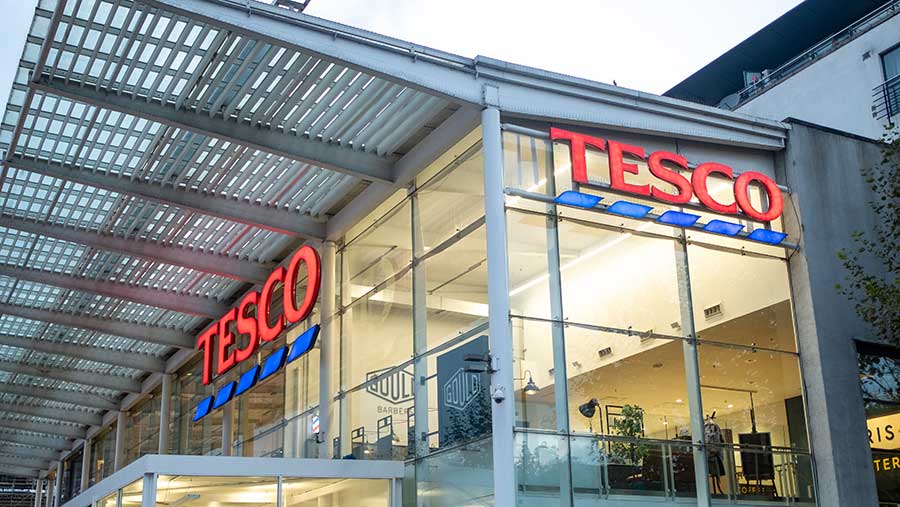Tesco under fire for new ‘fulfilment fee’ for suppliers
 © William/Adobe Stock
© William/Adobe Stock Farmers and growers are at risk of having additional fees imposed on produce sold to Tesco, much to the dismay of industry bodies.
Tesco is facing a major backlash after announcing its intention to introduce a new “fulfilment fee”, to be paid by its suppliers when their produce is sold through its website.
The UK’s largest supermarket is aiming to charge a pre-set amount, reported to be about 5-10p per item (subject to negotiation), for each item sold as part of an online order.
See also: Farmers warn of potato and veg shortages later this year
It is understood that the smallest suppliers will not be subject to the fulfilment fee, but very little information has been provided about this, and there are concerns that a proportion of these fees will still be passed on to farmers and growers by those further up the supply chain.
Suppliers to Tesco’s wholesale business, Bookers, have also been told a fee will be applied to all orders fulfilled on behalf of retail and catering customers.
The groceries code adjudicator (GCA) is due to look into the issue and determine whether Tesco has breached the Groceries Supply Code of Practice, following pleas from growers and industry bodies.
Lack of clarity
Jack Ward, chief executive of the British Growers Association, told Farmers Weekly the details of how this will work remain very unclear.
Mr Ward said: “In many instances, produce is being sold at below or around the cost of production. So, where anybody thinks they are going to find this extra margin to chip in towards the costs of the online sales is anybody’s guess. It’s simply not there.”
From a grower’s perspective, there are no more efficiencies to be had and it is extremely unlikely there is going to be a significant uplift in volumes being ordered to fund it out of increased sales, he added.
NFU president Minette Batters said the move from Tesco was a stark demonstration of the lack of fairness within the supply chain.
“At a time when crippling production costs mean many farmers and growers can’t afford to continue producing food at scale, resulting in supermarket shortages of fruit, salads and eggs, the food industry desperately needs fairness and collaboration, not further erosion of trust,” she said.
“Given Tesco’s approach of trying to railroad suppliers, giving only a few days’ notice, it’s doubly shocking to see the suggestion of repercussions should suppliers not agree to the fee.”
Tesco response
Farmers Weekly contacted Tesco to determine which suppliers would have to pay the fee, how much it would cost, and what exactly this means for growers and producers supplying the supermarket.
A Tesco spokesman said: “Over recent years, the way we serve our customers has grown in both capacity and complexity. Our customers expect us to serve them wherever, whenever, and however they want to shop.
“As we respond to changing shopping habits and our fulfilment costs continue to grow, we are talking to our suppliers about how we can work together to create a more balanced approach and ensure we can continue to invest in our customers.”
Farmers Weekly also contacted the British Retail Consortium (BRC), a trade association representing UK retail businesses, to comment on the use of fulfilment fees in the food retail sector.
A BRC spokesperson said: “On fulfilment fees – contracts between retailers and their suppliers are strictly regulated in accordance with the Groceries Supply Code of Practice. This Code, which has applied to the major supermarkets for over a decade, sets out what can and can’t be covered in contracts and is overseen by an independent regulator.”
Research backs increased domestic fruit and veg production
A further £500m could be added to the economy every year if the UK increased production of fresh fruit and vegetables by 30% during the next decade, according to research from the University of Warwick.
A new green paper titled Growing British found the fresh produce sector has the potential to add £3.2bn in direct GDP contributions in 2032.
The paper suggests the UK should look to increase its production and become less reliant on imported products.
Richard Napier, deputy head of the University of Warwick’s School of Life Sciences, said: “The current shortages of fresh food on supermarket shelves demonstrates the high dependence on imports of our diets in the UK.
“With appropriate support, the UK can and should grow much more of our fresh food – vegetables, salads, herbs and fruit,” Prof Napier added.
